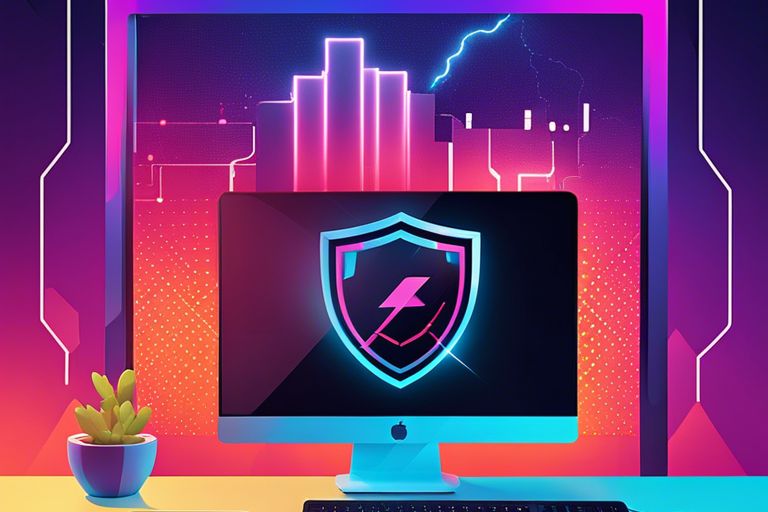5 Best VPNs for Windows PC — Secure and Fast in 2024
Just as your Windows PC enhances your digital experience, choosing the right VPN can profoundly impact your online security and privacy. With the increasing threats from hackers and the ongoing data collection practices by corporations, it’s crucial for you to protect your information effectively. In this guide, we’ll explore the top five VPNs for Windows in 2024, highlighting their features, speeds, and overall security, so you can make an informed choice to safeguard your online activities.

Key Takeaways:
- ExpressVPN: Rated as the best overall VPN for Windows due to its unmatched security features, fast speeds, and user-friendly interface. It supports a wide range of Windows versions and comes with a 30-day money-back guarantee.
- CyberGhost: Known for its optimized servers tailored for streaming, torrenting, and gaming on Windows. It offers a comprehensive Privacy Suite and a generous 45-day money-back guarantee for long-term plans.
- Private Internet Access (PIA): Features an extensive server network with over 35,000 servers, providing great access to global content. It allows for unlimited device connections and has robust security and privacy policies.
- NordVPN: Offers advanced privacy protection through its NordLynx protocol, although concerns about its data-sharing policy have been noted. It provides a strong level of security for Windows users.
- Surfshark: Noted for its IP Rotator feature, which enhances privacy by making tracking difficult. However, it may not be the most straightforward option for users engaged in torrenting.
Understanding VPNs: The Basics
For anyone navigating the digital world, understanding VPNs (Virtual Private Networks) is imperative for safeguarding your online activities.
What is a VPN?
Some VPNs create a secure tunnel between your device and the internet, masking your IP address and encrypting your online traffic. This makes it difficult for hackers and third parties to monitor your online actions.
How VPNs Work
While using a VPN, your internet traffic is routed through a server operated by the VPN provider rather than directly connecting to the internet. This process not only conceals your IP address but also encrypts your data, making it unreadable to anyone who intercepts it.
The encryption utilized by VPNs, often military-grade, ensures that your personal data remains private and secure from potential cyber threats. Traffic exiting from the VPN server appears to come from that server’s IP address, providing you with anonymity online. As a result, you can access geo-restricted content and enjoy a more secure browsing experience.
Types of VPNs for Windows PC
VPNs are available in various forms, tailored to suit different user needs on your Windows PC. You can choose based on the features that match your requirements.
| Type of VPN | Description |
|---|---|
| Remote Access VPN | Allows you to connect to a private network remotely over the internet. |
| Site-to-Site VPN | Connects two or more networks securely over the internet. |
| SSL VPN | Secured using SSL, suitable for accessing web applications securely. |
| IPsec VPN | Provides a secured connection by encapsulating and encrypting data packets. |
| Client-Based VPN | A VPN client installed on your device to connect to the VPN server. |
To understand these options, consider the varying security levels, connection types, and target applications. Each type offers distinct advantages based on your individual needs. Perceiving which VPN type suits you best can enhance your overall security experience.
VPNs for Windows PC come in a range of options that cater to different functionalities, ensuring a tailored user experience. Understanding these options allows you to make an informed decision regarding your internet safety.
- Remote Access VPNs: Suitable for individual users working remotely.
- Site-to-Site VPNs: Best for organizations with multiple locations.
- SSL VPNs: Ideal for secure web application access.
- IPsec VPNs: Excellent for data-sensitive transmissions.
- Client-Based VPNs: Offers user-friendly connections for personal devices.
Importantly, understanding the pros and cons of different VPN types equips you to choose the right solution, ensuring your online activities remain private and secure.
Why Use a VPN on Your Windows PC?
Assuming you prioritize privacy and security while browsing the internet, using a VPN on your Windows PC is necessary. A VPN encrypts your data, making it significantly harder for cybercriminals, hackers, and even your ISP to monitor your online activity. This level of protection is especially crucial in an age where data breaches are common and sensitive information is constantly at risk.
Enhanced Security and Privacy
Little do many users know that a VPN offers an extra layer of security that protects you while surfing the web. By encrypting your traffic, a VPN keeps your online activities safe from snoopers and potential hackers. This feature is particularly relevant for Windows users, who are often targeted by cyber threats.
Accessing Restricted Content
Restricted content is often frustrating for you, as geographical limitations block access to streaming services and websites. A VPN allows you to change your virtual location, enabling you to bypass these restrictions effortlessly.
Content that may not be available in your region can become accessible when you connect through a VPN. For instance, streaming platforms like Netflix and Hulu have different libraries depending on your location. By using a VPN, you can appear as if you’re browsing from a different country, opening up a world of movies, shows, and other media that you wouldn’t otherwise have access to. Moreover, this capability extends to social media sites and news outlets, ensuring you stay informed and entertained without restrictions.
Improved Online Gaming Experience
For online gamers, using a VPN can enhance your gaming experience by reducing lag and providing access to region-locked games. This can result in a smoother and more enjoyable gameplay session.
Understanding how latency and connection speed can impact your gaming can change your approach. By connecting to gaming servers that are closer to your virtual location, you can experience lower ping rates, which translates to faster response times and an edge over other players. Additionally, VPNs can help you avoid DDoS attacks, a common issue that can disrupt your gaming experience. With the right VPN, you can enjoy a secure, competitive, and lag-free gaming environment.
Factors to Consider When Choosing a VPN for Windows
Once again, it’s crucial to know what to look for when selecting a VPN for your Windows PC. With numerous options available, you want to ensure you choose one that meets your specific needs. Here are the crucial factors to consider:
- Security Features – Look for military-grade encryption, a reliable kill switch, and a proven zero-logs policy.
- Speed and Performance – Ensure the VPN provides fast connections, especially for high-bandwidth activities such as streaming and gaming.
- Compatibility with Windows Versions – Make sure the VPN supports your specific version of Windows, from Vista to the latest.
- Server Network – A vast server network can enhance your ability to access global content and ensures a stable connection.
- Ease of Use – Choose a VPN with a user-friendly interface tailored for Windows to make your experience seamless.
Thou should prioritize these factors when making your decision.
Security Features
Some of the most critical aspects of your chosen VPN should include robust security features. For a secure browsing experience, look for military-grade encryption, a capable kill switch, and a verified zero-logs policy. These features will protect your online privacy and ensure that your data remains safe from prying eyes.
Speed and Performance
Now, let’s talk about speed and performance. A VPN can provide top-tier security, but it must also deliver fast and stable connections. Look for providers that use advanced protocols like WireGuard or proprietary solutions to minimize speed loss. Ideally, you should aim for a VPN that maintains fast speeds even on distant servers, enabling you to enjoy seamless streaming and gaming experiences.
When evaluating speed, consider how various VPNs handle different online activities. For instance, while testing ExpressVPN, I experienced only a 16% drop in speed, which is remarkable compared to many competitors. This efficiency is crucial, especially if you plan on engaging in high-bandwidth activities like downloading large files or streaming high-definition content.
Compatibility with Windows Versions
Speed is another consideration: ensure your VPN is compatible with your Windows operating system. Whether you’re using older versions like Vista or XP or the latest Windows 11, the VPN should provide seamless integration. This compatibility ensures you can easily install the software and benefit from its features without any hurdles.
Security is paramount for any VPN, particularly as Windows is often targeted by hackers. A VPN should support a variety of Windows versions while keeping up with regular updates to adapt to the latest security threats. With a large user base, a well-supported VPN will frequently update its software to address vulnerabilities, thus enhancing your overall protection.

Step-by-Step Guide: How to Set Up a VPN on Windows
After choosing the right VPN service for your Windows PC, it’s imperative to know how to set it up effectively. This guide will walk you through the process, ensuring that you maximize your online security and privacy.
Table: Steps to Set Up a VPN on Windows
| Step | Description |
| 1. Downloading and Installing the VPN | Access the VPN’s official website, select the Windows version, and follow the installation prompts to get the software on your device. |
| 2. Configuring VPN Settings | Launch the VPN app and log in. You can adjust settings for optimal performance, such as selecting the preferred protocol and enabling auto-connect features. |
| 3. Connecting to the VPN | Choose a server location from the app and click connect. You’re now secure online, with your traffic encrypted. |
Downloading and Installing the VPN
Any VPN you choose should have a straightforward installation process. Navigate to the official website of your selected VPN provider, like ExpressVPN or CyberGhost, and download the Windows client. Once the download is complete, run the installation file and follow the prompts to complete the setup. This ensures you have the latest version with all the necessary security features and updates.
Configuring VPN Settings
Windows apps often come with default settings, but you should tailor these to your needs. Adjusting connection protocols (like OpenVPN or WireGuard) and enabling features such as the kill switch can significantly enhance your security. You might also want to enable auto-connect and split tunneling, depending on how you plan to use your VPN.
Plus, taking the time to configure your VPN settings properly can improve your experience. For example, enabling leak protection ensures that your actual IP address remains hidden, even if the VPN connection drops momentarily. It’s crucial to select the right server location to balance speed and security and take advantage of features that help you control what data you send through the VPN.
Connecting to the VPN
For your first connection, simply open the VPN application, select your desired server location, and click the connect button. This process is generally seamless and will provide immediate protection for your online activities.
Settings and features can vary between different VPN providers, but the connection process remains quite straightforward. Always check for an indication that you are securely connected (often shown by a padlock icon) before engaging in any sensitive online activities. This provides peace of mind, knowing your data is encrypted and your privacy protected.
Tips for Optimizing VPN Use on Windows PC
Despite the numerous benefits of using a VPN, there are several strategies you can employ to optimize its performance on your Windows PC. These tips will help you enhance your online security and experience. Consider the following:
- Choose the right server for your needs.
- Adjust settings to maximize speed.
- Manage your VPN connection effectively.
- Regularly update your VPN software.
- Utilize split tunneling when necessary.
Knowing these strategies will ensure you get the most out of your VPN while keeping your data secure.
Choosing the Right Server Location
Now, selecting the optimal server location is crucial for achieving the best performance. Connect to a server that is geographically closer to you, as this will typically provide faster speeds and lower latency. Moreover, if you’re looking to access specific content, choose a server in a country where that content is available. This tactic allows you to maximize the effectiveness of your VPN while ensuring a smoother browsing experience.
Adjusting Settings for Maximum Speed
The settings of your VPN can significantly influence your connection speed. Make sure to explore your VPN app’s settings to optimize performance. You might experiment with different protocols and enable features like split tunneling to route your traffic more efficiently. This could help in prioritizing certain applications while minimizing the load on others.
Right adjustments in your VPN settings can lead to noticeable improvements. For instance, switching to the WireGuard protocol can enhance speeds due to its modern architecture, and enabling data leak protection ensures your sensitive information remains secure without sacrificing performance. Always test different settings based on your activities, as each configuration may yield unique results tailored to your specific needs.
Managing Your VPN Connection
Optimizing how you manage your VPN connection can ensure consistent performance. Regularly check your connection stability and speed, especially when switching servers or protocols. This practice will alert you to any performance issues and help you troubleshoot them quickly.
This proactive approach allows you to maintain a reliable internet connection. Set reminders to disconnect and reconnect to refresh your connection, particularly if you notice slower speeds or increased latency. Additionally, utilizing the kill switch feature can protect your data in case of sudden disconnections, ensuring that your online activities stay private and secure. Overall, being attentive to your VPN management will enhance your experience on Windows while keeping your data safe.
In-Depth Reviews of the 5 Best VPNs for Windows PC in 2024
Now, let’s investigate into the detailed reviews of the top five VPNs for Windows that guarantee both security and speed in 2024.
ExpressVPN: Strong Security and Unmatched Speed
You will find that ExpressVPN stands out with its exceptional security measures, including military-grade encryption and a verified zero-logs policy. This VPN delivers lightning-fast speeds, ensuring minimal disruption during high-bandwidth activities such as streaming or torrenting. With a user-friendly app and reliable 24/7 customer support, ExpressVPN is designed to keep your online activities secure and private.
CyberGhost: Best for Streaming and User-Friendly Interface
On the other hand, CyberGhost excels in providing optimized servers dedicated to streaming, gaming, and torrenting, making it an excellent choice for Windows users. With over 11,676 servers in 100 countries, you can efficiently bypass geo-restrictions with ease. The intuitive interface and Smart Rules feature allow you to effortlessly customize your experience, ensuring a seamless connection.
VPNs like CyberGhost cater to users who prioritize convenience without sacrificing security. Its specialized streaming servers have proven reliable in accessing popular platforms, which streamlines the user experience. The built-in Privacy Suite offers a comprehensive solution for protecting your data while browsing. Furthermore, with a generous 45-day money-back guarantee, you can try CyberGhost risk-free.
Private Internet Access: Extensive Server Network
Strongly positioning itself as a top contender, Private Internet Access (PIA) boasts an enormous server network with 35,000+ servers across 91 countries, giving you wider access to content on your Windows PC. The unlimited device connections further enhance its appeal, making it convenient for households with multiple devices.
With such a vast network, PIA offers reliable speeds and access to local content from less common regions. This is particularly advantageous for users seeking to connect from areas with limited VPN services. Coupled with strong security features, including data leak protection and a solid 30-day money-back guarantee, PIA ensures your online safety while providing a user-friendly experience.
Pros and Cons of Each VPN for Windows
All VPNs come with their own strengths and weaknesses. Understanding these can help you make an informed choice that best fits your needs. Below is a breakdown of the pros and cons for each VPN recommended for Windows.
| VPN | Pros and Cons |
|---|---|
| ExpressVPN | Excellent speed; strong security features; user-friendly interface; wide server network; 30-day money-back guarantee. |
| CyberGhost | Optimized servers for streaming; good privacy features; 45-day money-back guarantee; dedicated IP available. |
| Private Internet Access (PIA) | Massive server network; unlimited device connections; strong privacy policies; 30-day money-back guarantee. |
| NordVPN | Strong security protocols; user-friendly; offers the NordLynx protocol for faster speeds; global server network. |
| Surfshark | Unlimited device connections; IP Rotator for enhanced privacy; offers competitive pricing. |
Pros of ExpressVPN
One of the standout features of ExpressVPN is its unmatched speed. With a global network of over 3,000 servers in 105 countries, you’re bound to find a reliable and fast connection no matter where you are. The military-grade encryption and a strict no-logs policy ensure that your data remains secure and private while using Windows. Plus, the intuitive interface makes it accessible for users of all technical levels.
Cons of ExpressVPN
Each VPN has its drawbacks, and for ExpressVPN, the primary concern is its higher subscription cost. While the service offers remarkable features, the pricing may deter budget-conscious users. Furthermore, while its extensive server network provides excellent speed, some users might find that it occasionally struggles to bypass geographic restrictions with certain streaming services.
Understanding the cost of ExpressVPN is crucial for your decision-making. Although priced higher than many competitors, it’s imperative to weigh this against the speed, security, and reliability you receive. A risk-free 30-day money-back guarantee does provide an opportunity to test the service, but the initial investment may be a stumbling block for some users.
Pros and Cons of Other Top VPNs
Pros, like those of the top contenders, are significant and vary from robust feature sets to potential failures. Here’s a concise overview of pros and cons for the other recommended VPN services.
| VPN | Pros and Cons |
|---|---|
| CyberGhost | Specialized streaming servers; privacy suite; good speeds; 45-day money-back guarantee. |
| Private Internet Access (PIA) | Extensive server network; great privacy protections; unlimited devices; 30-day money-back guarantee. |
| NordVPN | Strong security features; user-friendly; newer protocols for better speeds. |
| Surfshark | Unlimited connections; competitive pricing; various privacy features. |
Windows users should be aware that while each VPN has its own advantages, they also come with distinct limitations. Some may have trouble accessing certain streaming platforms, while others might lag in customer support responsiveness. Evaluating these factors carefully will ensure that you select a VPN that meets your specific needs regarding speed, privacy, and accessibility.
Comparing the Top VPNs for Windows: Features and Pricing
Now, choosing the right VPN for your Windows PC involves evaluating features and pricing options. Each VPN offers unique capabilities that cater to various needs, such as streaming, security, and speed. Below is a comparative analysis of the top VPNs for Windows based on their features and pricing.
| VPN | Key Features |
| ExpressVPN | Military-grade encryption, kill switch, split tunneling, and 3,000+ servers in 105 countries. |
| CyberGhost | Optimized servers for streaming and torrenting, 11,676+ servers in 100 countries. |
| Private Internet Access | 35,000+ servers, unlimited device connections, and robust privacy features. |
| NordVPN | NordLynx protocol, 5,400+ servers, and unique security features. |
| Surfshark | IP Rotator, unlimited devices, and user-friendly interface. |
Pricing Overview
Pricing is crucial when selecting a VPN, as you want to ensure you receive the best value for your investment. Each VPN has different pricing plans that cater to various budgets and usage needs.
| VPN | Starting Price |
| ExpressVPN | $6.67/month (1-year + 3 months free) |
| CyberGhost | $2.19/month (2-year + 2 months) |
| Private Internet Access | $2.85/month (2-year plan) |
| NordVPN | $3.99/month (2-year plan) |
| Surfshark | $2.49/month (2-year plan) |
VPNs like ExpressVPN and CyberGhost offer solid performance, but you’ll pay a premium for advanced security features. If you’re looking for budget-friendly options, Private Internet Access and Surfshark provide excellent services without breaking the bank, ensuring you have access to crucial features. Pricing should align with your specific needs; consider what functionalities you prioritize before making a choice.
Value-for-Money Assessment
Now, assessing the value-for-money of each VPN is vital for ensuring you get the most bang for your buck. A good VPN provides a balance of features, speed, and security at an affordable price.
The most valuable VPNs not only offer security but also ensure fast connections and optimal performance across various platforms. For instance, ExpressVPN may be on the pricier side, but it offers unmatched speed and a comprehensive security suite, making it an excellent investment for frequent users. In contrast, CyberGhost provides exceptional value with its extensive server network and optimized features at a lower cost, making it perfect for streaming enthusiasts.

Common Issues with VPNs on Windows and Solutions
Not all VPNs for Windows function flawlessly, and many users encounter common issues that can hinder their online experience. From connection disruptions to performance slowdowns, being aware of these potential problems and their solutions can significantly enhance your VPN usage.
Connection Problems
The most frustrating issue users face with VPNs on Windows is connection problems, such as failures to connect to servers or unexpected disconnections. These issues can arise due to firewall settings, unstable internet connections, or protocol mismatches. To resolve these, consider switching protocols in your VPN settings or temporarily disabling your firewall to see if that resolves the issue.
Slow Speeds
Slow internet speeds while using a VPN can be a significant annoyance. This commonly occurs due to factors like server distance, network congestion, and the encryption process itself, which can range from 16% to more during peak times. Switching to a closer server or using VPNs with faster protocols—like ExpressVPN’s proprietary Lightway—can help you achieve better speeds.
Solutions for speed issues may involve selecting a server that’s optimized for your activity, disabling unnecessary features such as the kill switch, or even trying out the split tunneling feature if your VPN supports it. Additionally, ensuring your internet connection is stable before connecting to the VPN can prevent further slowdowns.
Compatibility Issues
One of the more common concerns you might face is compatibility issues, especially with specific applications or websites. Not all VPNs work seamlessly with all software, leading to frustrating interruptions. This is particularly true for video streaming services that frequently update their systems to block VPN traffic.
With a robust VPN like ExpressVPN, you can minimize these compatibility hassles. Its extensive server network allows access to various streaming services without interruption, and ongoing updates ensure improved compatibility with your favorite apps. The ability to use multiple connections also means you can enjoy your VPN across several devices, enhancing convenience and coverage.
FAQs: Your VPN Questions Answered
Once again, many users have questions about VPNs and their functionality. In this section, we’ll address some common concerns and provide clarity on how to get the most out of your VPN for Windows.
Are VPNs legal in my country?
If you’re wondering about the legality of VPNs, it largely depends on your jurisdiction. In most countries, including the United States and Canada, VPNs are legal to use for personal and business purposes. However, some regions, like China and Russia, impose restrictions on VPN usage. Always check your local laws to stay compliant.
Can I use the same VPN for my mobile devices?
There’s a good chance you can use the same VPN for your mobile devices. Most reputable VPN providers, like ExpressVPN and CyberGhost, offer cross-platform compatibility, allowing you to secure multiple devices with a single subscription.
Answered, many VPNs provide apps for various operating systems, including Windows, Android, and iOS. This means you can download the same service on your smartphone or tablet, often connecting up to a specified number of devices simultaneously. For example, ExpressVPN allows you to connect up to 8 devices at once, giving you the flexibility to secure all your personal gadgets.
What to do if my VPN isn’t working with certain websites?
Some issues may arise when your VPN isn’t effectively accessing specific websites. This can be due to geo-blocking or restrictions placed on VPN traffic by those sites. First, consider trying different servers within your VPN app or contacting customer support for guidance.
With persistent issues, switching servers is often the quickest fix. If a particular server is being blocked, connecting to a different server location may help you regain access. Additionally, clearing your browser cache or temporarily disabling WebRTC can also resolve connectivity problems, ensuring you can securely browse your desired sites without interruption.
Additional Tools and Resources for a Secure Windows Experience
Unlike many users think, achieving optimal security on your Windows PC goes beyond just using a VPN. A multi-faceted approach incorporating various tools and resources is necessary to protect your personal information and enhance your online experience.
Antivirus Software
Secure your Windows experience by utilizing reliable antivirus software. This protective measure helps detect and eliminate malicious threats, enhancing your overall security. Regular updates and real-time scanning are crucial to combat the latest malware, ensuring your system remains shielded against attacks.
Firewall Settings
Antivirus programs can effectively identify and remove threats, but it’s necessary to configure your firewall settings for a deeper layer of protection. Windows offers built-in firewall options to monitor and control incoming and outgoing traffic, blocking unwanted access to your network and device.
Experience enhanced security by ensuring your firewall is active and customized to your needs. Adjust rules to allow trusted applications while denying access to suspicious ones, thereby creating a safer online environment. Opt for additional third-party firewall tools if you desire more advanced controls to strengthen your defenses even further.
Browser Extensions
On top of a solid VPN like ExpressVPN, incorporating browser extensions can further protect your online activities. Extensions that block trackers, ads, and malicious scripts will enhance your privacy and improve loading speeds while offering additional threats’ protection.
Browser security extensions can be highly beneficial in today’s digital landscape where online threats are rampant. Tools like HTTPS Everywhere and Privacy Badger will automatically secure your connection and limit tracking by websites, allowing you to navigate the web with greater confidence and control over your personal data.
Future of VPN Technology for Windows Users
Keep an eye on the evolving landscape of VPN technology as it continues to advance in both security and functionality. Users can expect more integrated solutions that enhance online safety and privacy while navigating the internet, given the ever-increasing cyber threats.
Trends in Security and Privacy
Assuming you prioritize your online safety, the trend is shifting towards stronger end-to-end encryption and enhanced anonymity features. With advancements like multi-hop connections and improved zero-logs policies, your data will be more secure than ever, reducing the risk of leaks and unauthorized access.
Potential Developments in VPN Services
Potential innovations in VPN services include artificial intelligence-enhanced security features, enabling real-time threat detection and automatic protocol adjustments based on activity. This will give you a smoother and more secure browsing experience.
Privacy concerns have driven companies to explore decentralized VPNs, which could minimize central control and maximize user security. Expect features like blockchain technology to play a major role in ensuring anonymity and access to global content without compromising privacy.
Importance of Regular Updates
Some VPNs are not as effective if they do not regularly update their software. During your use, version updates can patch vulnerabilities and enhance security features, keeping your data protected from evolving threats.
Users must remain vigilant about the importance of consistent updates to maintain the highest levels of security. Failing to update could expose your device to security risks and leave your sensitive information vulnerable. Regular updates ensure that your VPN adapts to new threats and keeps your connection as secure as possible.
User Testimonials: Real Experiences with VPNs on Windows
To provide a clearer picture of how VPNs perform on Windows, we’ve gathered user testimonials showcasing their real experiences. This feedback is invaluable in understanding the strengths and weaknesses of popular VPN services available in 2024.
Positive Experiences
The majority of users report high satisfaction levels with ExpressVPN and CyberGhost. Many highlight how ExpressVPN offers superfast connections and robust security features, making streaming and torrenting smooth. Users appreciate the 30-day money-back guarantee, feeling secure knowing they can easily get a refund if needed.
Critical Feedback
Experiences with VPNs can also yield critical feedback, particularly regarding Private Internet Access (PIA) and its accessibility of certain streaming platforms. While some users laud its extensive server network, others have faced challenges accessing popular content.
It’s important to note that while PIA boasts an enormous 35,000+ server network, users have reported issues when trying to connect to platforms like Netflix or Hulu. As a result, some found themselves frustrated, questioning the service’s ability to provide truly global access to content.
Lessons Learned
With so many VPN options available, you should approach your selection with a clear understanding of your specific needs, whether it’s for streaming, gaming, or maintaining privacy. Not every VPN excels in all areas, so assessing critical feedback can guide your decision.
Understanding user experiences helps you identify the right VPN service tailored to your usage patterns. For instance, if you prioritize streaming and speed, opting for VPNs like ExpressVPN may be advisable. However, if your focus leans more towards anonymous browsing, you might want to explore other options that emphasize privacy features more intensively.
To wrap up
With these considerations, choosing the right VPN for your Windows PC in 2024 can significantly enhance your online privacy and security. Whether you prioritize speed, streaming compatibility, or robust security features, options like ExpressVPN, CyberGhost, Private Internet Access, NordVPN, and Surfshark cater to a variety of needs. Evaluate their unique offerings and find the VPN that best fits your lifestyle, ensuring a safer and smoother online experience.







